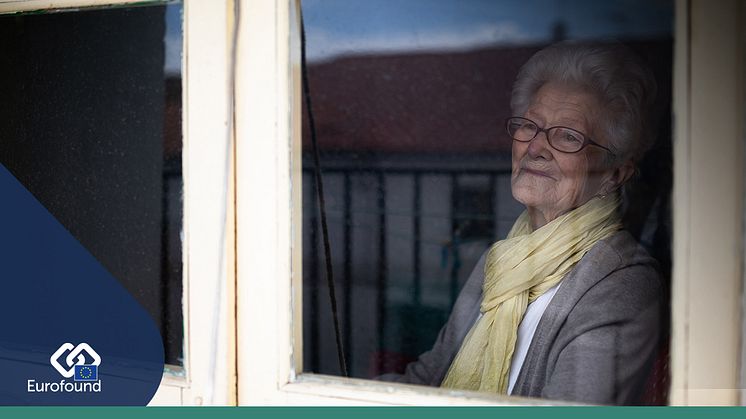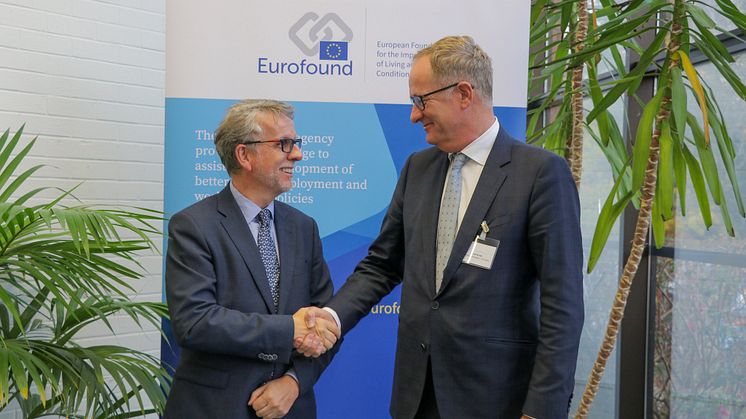COVID-19 could compound disadvantage for workers with disabilities
The COVID-19 pandemic is having negative and far-reaching consequences on labour market participation and social inclusion, which may further disadvantage people with disabilities.

The COVID-19 pandemic is having negative and far-reaching consequences on labour market participation and social inclusion, which may further disadvantage people with disabilities.

Short-time work or similar measures were implemented in all EU Member States during 2020 and contributed greatly to limiting the rise in unemployment that resulted from the COVID-19 pandemic. However, further success was hampered by varying levels of income protection between countries, as well as limitations in coverage.

There were 5.7 million fewer people in employment in the EU by spring 2020 than at the end of 2019, and 6.3 million fewer compared with the trend growth that could have been expected before the COVID-19 pandemic.

Eurofound’s new policy brief on ‘Education, healthcare and housing - How access changed for children and families in 2020’ focuses on the aspects of accessibility for children and families for which Eurofound has data and highlights differences in accessibility before and during the COVID-19 pandemic.

This year’s theme to mark International Women’s Day on 8 March is Choose to Challenge (or #ChooseToChallenge, if you prefer). The idea is to highlight that ‘from challenge comes change’ and that ‘we can all choose to challenge and call out gender bias and inequality’.

Europe saw two decades of improvement in working conditions in a multitude of areas prior to COVID-19. However, progress in a number of areas, such as gender pay gaps, gender segregation in labour markets, psychosocial risks, and work intensity, were fragile and advancements over 20 years now risk being diluted in less than 20 months.

While 2020 may come to be seen as the year platform work gathered pace and started to go mainstream – thanks in large part to COVID-19 containment measures sparking an increase in food and grocery delivery – 2021 could be the year that regulation of platform work is set in motion.

Eurofound’s Living, working and COVID-19 online survey aims to capture the far-reaching implications of the pandemic for the way people live and work across Europe. Two rounds of the online survey have been carried out to date. The third round is launched today, 15 February, and will be open until 29 March 2021.

Eurofound has published updated monthly comparable data, converted to euro and standardised across 12 months, for 21 EU Member States and the United Kingdom for 2021

The employment toll of COVID-19 has been stark in Europe, and it could have been even greater had it not been for the adoption of unprecedented assistance measures in all Member States, supported by the European Union. But have these policies benefited different groups in the labour market equally, or have they cemented existing inequalities in access to support?

Nominal statutory minimum wages in most Member States and the UK continued to rise in 2021. With inflation being low, this has resulted in real increases for those minimum wage workers who have managed to retain their jobs and the same working hours.

The employment fallout of COVID-19 has been a story of two types of service work. Office-based knowledge workers have largely kept their jobs and incomes while working from home; whereas client-facing service workers have borne the brunt of the lockdowns and the steep declines in demand for in-person services in restaurants, hotels, leisure and the arts.

In the most successful businesses, managers were found to facilitate employees to work independently rather than to focus on controlling whether they carried out their tasks. Closely monitoring employee behaviour might indeed ensure that workers do their job but is unlikely to motivate them to go beyond their job description.

Standard employment is not simply being replaced by non-standard work; employment is becoming more diverse, and policy must accordingly become more tailored.

Stefan Gran has been elected Chair of Eurofound’s Management Board during the third meeting of the Board on 6 November 2020. He takes over from outgoing chair Aviana Bulgarelli, Ministry of Labour and Social Policies (Ministero del Lavoro, della Salute), Italy.

Eurofound’s new flagship report ‘Challenges and prospects in the EU: Industrial relations Developments 2015-2019’ provides an overview of developments in industrial relations and social dialogue in recent years, prior to the COVID-19 outbreak.

An ageing Europe and rising public expenditure on long-term care have signalled for some time that the fundamentals of care provision need to be addressed. However, the shocking death toll in care homes during the COVID-19 pandemic and the fact that many long-term care services were ill-equipped to protect their vulnerable users have lately focused the public mind on the issue.

At the end of his term as Executive Director on 30 November 2020, we engaged in a socially distant interview with Juan Menéndez-Valdés to review the last decade, his thoughts on Europe and his hopes for Eurofound.

The COVID-19 crisis has led to a doubling of restructuring job loss in the first half of 2020. The new European Restructuring Monitor ‘ERM report 2020: Restructuring across borders’ reviews recent restructuring activity in the EU, from January 2019 up to and including the first impacts of the COVID-19 crisis. It also presents an analysis of transnational restructuring cases.

The gender pay gap in gross hourly earnings in the EU was 14.8% in 2018. To help combat discriminatory pay practices by employers, the European Commission recommended in 2014 the introduction of pay transparency measures in all Member States. But more than half still have not implemented any such measures. Where do Member States currently stand on the agenda?
